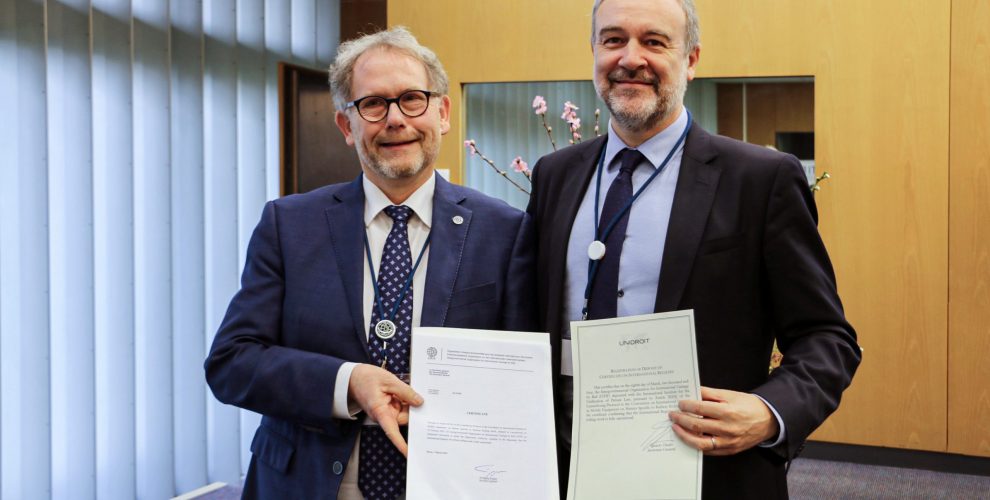 On 8 March 2024, at a special intergovernmental meeting at the Universal Postal Union in Bern, Switzerland, the Luxembourg Rail Protocol to the Cape Town Convention on International Interests in Mobile Equipment formally entered into force. The ceremony follows the successful conclusion of the 12th and final session of the Preparatory Commission, during which the documents related to the functioning of the Supervisory Authority, as well as the Registry Regulations and Procedures were approved, allowing the formal deposit of a certificate from OTIF with UNIDROIT regarding the functioning of the International Registry pursuant to Article XII, paragraph 8 of the Luxembourg Protocol. The Luxembourg-based public international registry is now operational 24/7 and able to accredit users, allocate unique (URVIS) numbers for rolling stock, accept registrations of security interests, and facilitate searches against these interests.
On 8 March 2024, at a special intergovernmental meeting at the Universal Postal Union in Bern, Switzerland, the Luxembourg Rail Protocol to the Cape Town Convention on International Interests in Mobile Equipment formally entered into force. The ceremony follows the successful conclusion of the 12th and final session of the Preparatory Commission, during which the documents related to the functioning of the Supervisory Authority, as well as the Registry Regulations and Procedures were approved, allowing the formal deposit of a certificate from OTIF with UNIDROIT regarding the functioning of the International Registry pursuant to Article XII, paragraph 8 of the Luxembourg Protocol. The Luxembourg-based public international registry is now operational 24/7 and able to accredit users, allocate unique (URVIS) numbers for rolling stock, accept registrations of security interests, and facilitate searches against these interests.
“The entry into force of the Luxembourg Rail Protocol is an extraordinary achievement that supports urgently needed access to private credit for the rail industry” said Ignacio Tirado, Secretary General of UNIDROIT, the International Institute for the Unification of Private Law. “At a time when an increasing number of states seek to implement transport policies that contribute towards the UN’s Sustainable Development Goals, the Protocol is a key instrument, recognized by regional bodies including UNECA, the African Union, UNECE and the EU. UNIDROIT believes that the Luxembourg Rail Protocol has the potential to unlock enormous benefits for all stakeholders as its ratification rolls out around the world”.
“The entry into force of the Luxembourg Protocol is great milestone for OTIF that has been reached” said Wolfgang Küpper, Secretary General of OTIF, the Intergovernmental Organisation for International Carriage by Rail. “The Supervisory Authority is established, the International Registry is going live. For OTIF the task of the Secretariat will be new and challenging, because it will be quite different from its existing task namely to promote, improve, and facilitate international traffic by rail in all aspect. I am convinced that the new global task in the framework of the Luxembourg Protocol will help interested states to better understand the role and the full portfolio offered by OTIF. Governments and the railway industry can no longer afford not to use additional financing instruments. This is where the Luxembourg Protocol fits in perfectly.”
“This is a momentous day for the rail industry,” said Rail Working Group Chairman Howard Rosen. “It opens up new possibilities for the private sector to provide much-needed and cheaper financing for railway rolling stock around the world. With the clear social, economic, and environmental benefits of moving the transportation of goods and people onto the railways, and public funding nearly always limited, governments now need to move forward at the earliest opportunity to ratify the Protocol.”
“We are pleased to launch the International Registry of Interests in Rolling Stock — providing new opportunities for sector advancement and protection on the international stage,” said ISC President and CEO, Shawn Peters. ISC is the parent company of the newly appointed Registrar for the International Registry, Regulis SA. “Both ISC and Regulis are proud of the economic and environmental impact the Rolling Stock Registry will have as it supports the growth of the global rail sector by providing a trusted source for interests in rolling stock. We value our partnerships with UNIDROIT, OTIF, and the Rail Working Group, and we look forward to working with all stakeholders who will benefit from the Registry, as well as growing the registry in the years to come.”









 Professor Iacopo Donati is the UNIDROIT/Bank of Italy Chair Holder and is mainly responsible for assisting in the Bank Insolvency project. He is Professor of Corporate and Insolvency Law at the University of Siena, and coordinates the research project ‘Pro.Re.Ba.’ (Proportionating rules on bank crisis prevention and management to the case of retail banks), which has received funding from the Italian Ministry of University. He has previously taught corporate law at the University of Venice ‘Ca’ Foscari’, at the University of Florence and at the University of Rome ‘Tor Vergata’.
Professor Iacopo Donati is the UNIDROIT/Bank of Italy Chair Holder and is mainly responsible for assisting in the Bank Insolvency project. He is Professor of Corporate and Insolvency Law at the University of Siena, and coordinates the research project ‘Pro.Re.Ba.’ (Proportionating rules on bank crisis prevention and management to the case of retail banks), which has received funding from the Italian Ministry of University. He has previously taught corporate law at the University of Venice ‘Ca’ Foscari’, at the University of Florence and at the University of Rome ‘Tor Vergata’.
 rtered Institute of Arbitrators (London). He further holds a post-graduate diploma in law from the Kenya School of Law. Allan is also a scholar from the Hague Academy of International Law.
rtered Institute of Arbitrators (London). He further holds a post-graduate diploma in law from the Kenya School of Law. Allan is also a scholar from the Hague Academy of International Law.


 rofessor Ignacio Tirado was appointed Secretary-General by the Governing Council at its 97th session, and officially took office on 27 August 2018. A national of Spain, Professor Tirado (Commercial, Corporate and Insolvency Law, Universidad Autónoma of Madrid, Spain) holds a PhD from the Universities of Bologna and Autónoma de Madrid and an LLM from the University of London. Professor Tirado has been a Senior Legal Consultant at the World Bank’s Legal Vice-Presidency and Financial Sector Practice for more than nine years, having also consulted for the IMF on insolvency related matters as well as for the Asian Development Bank on commercial legal reform.
rofessor Ignacio Tirado was appointed Secretary-General by the Governing Council at its 97th session, and officially took office on 27 August 2018. A national of Spain, Professor Tirado (Commercial, Corporate and Insolvency Law, Universidad Autónoma of Madrid, Spain) holds a PhD from the Universities of Bologna and Autónoma de Madrid and an LLM from the University of London. Professor Tirado has been a Senior Legal Consultant at the World Bank’s Legal Vice-Presidency and Financial Sector Practice for more than nine years, having also consulted for the IMF on insolvency related matters as well as for the Asian Development Bank on commercial legal reform. A Swedish national, Ms Lena Peters grew up in Italy where she attended an English school. In 1978 she took her Juris Kandidatexamen at Stockholm University followed by a Master of Laws from King’s College, London (1979). Since 1985 she has been with UNIDROIT, first as Research Officer, lastly as Principal Legal Officer, her main duties being Secretary to the Working Group for the Preparation of Principles of International Commercial Contracts, Secretary to the Study Group on Franchising, Secretary to the Committee of Governmental Experts on Franchising.She also collaborated on the project for the preparation of the ELI-Unidroit Model European Rules of Civil Procedure. She is currently Managing Editor of the Uniform Law Review and responsible for publications at UNIDROIT.
A Swedish national, Ms Lena Peters grew up in Italy where she attended an English school. In 1978 she took her Juris Kandidatexamen at Stockholm University followed by a Master of Laws from King’s College, London (1979). Since 1985 she has been with UNIDROIT, first as Research Officer, lastly as Principal Legal Officer, her main duties being Secretary to the Working Group for the Preparation of Principles of International Commercial Contracts, Secretary to the Study Group on Franchising, Secretary to the Committee of Governmental Experts on Franchising.She also collaborated on the project for the preparation of the ELI-Unidroit Model European Rules of Civil Procedure. She is currently Managing Editor of the Uniform Law Review and responsible for publications at UNIDROIT. Marina Schneider is Principal Legal Officer and Treaty Depositary at UNIDROIT. She studied law at the University of Strasbourg (France) and Paris I – Panthéon Sorbonne. She joined the UNIDROIT in 1987 and was involved in the elaboration and French versions of most UNIDROIT instruments since. She is in charge of the 1995 UNIDROIT Convention on Stolen or Illegally Exported Cultural Objects and of the UNESCO-UNIDROIT Model Provisions on State Ownership of Undiscovered Cultural Objects. She is the author of the Explanatory Report of the 1995 Convention and many articles on the Convention and other international instruments in the field. Ms Schneider is also responsible for the project on private collections and for the UNIDROIT Convention Academic Project (UCAP). She is member of the Board of the International Society for Research on Art and Cultural Heritage Law (ISCHAL).
Marina Schneider is Principal Legal Officer and Treaty Depositary at UNIDROIT. She studied law at the University of Strasbourg (France) and Paris I – Panthéon Sorbonne. She joined the UNIDROIT in 1987 and was involved in the elaboration and French versions of most UNIDROIT instruments since. She is in charge of the 1995 UNIDROIT Convention on Stolen or Illegally Exported Cultural Objects and of the UNESCO-UNIDROIT Model Provisions on State Ownership of Undiscovered Cultural Objects. She is the author of the Explanatory Report of the 1995 Convention and many articles on the Convention and other international instruments in the field. Ms Schneider is also responsible for the project on private collections and for the UNIDROIT Convention Academic Project (UCAP). She is member of the Board of the International Society for Research on Art and Cultural Heritage Law (ISCHAL). Professor of Commercial Law, Carlos III University of Madrid. Currently, Sir Roy Goode Scholar at UNIDROIT, Rome, 2021-2022. Chair of Excellence 2017-2018 at University of Oxford (Uc3m- Santander Program), affiliated to Harris Manchester College. Previously Distinguished Visiting Professor and fellow of a number of Academic Institutions. Arbitrator of Madrid Court of Arbitration. Member of ELI (European Law Institute) Council and Executive Committee. Member of the Expert Group of the European Commission on Liability and New Technologies and member of the Expert Group of the European Observatory of Platform Economy; the International Academy of Commercial and Consumer Law; the expert group of the Inclusive Global Legal Innovation Platform for Online Dispute Resolution – UNCITRAL and Hong Kong Department of Justice. Expert of the UNIDROIT Study Group on the MAC Protocol of the Cape Town Convention on International Interests. Delegate of Spain to UNIDROIT for the adoption of the Protocol, delegate of Spain in Working Group VI of UNCITRAL on secured transactions and in Working Group IV on Electronic Commerce. Member of UNIDROIT Working Groups on Enforcement and Warehouse Receipts.
Professor of Commercial Law, Carlos III University of Madrid. Currently, Sir Roy Goode Scholar at UNIDROIT, Rome, 2021-2022. Chair of Excellence 2017-2018 at University of Oxford (Uc3m- Santander Program), affiliated to Harris Manchester College. Previously Distinguished Visiting Professor and fellow of a number of Academic Institutions. Arbitrator of Madrid Court of Arbitration. Member of ELI (European Law Institute) Council and Executive Committee. Member of the Expert Group of the European Commission on Liability and New Technologies and member of the Expert Group of the European Observatory of Platform Economy; the International Academy of Commercial and Consumer Law; the expert group of the Inclusive Global Legal Innovation Platform for Online Dispute Resolution – UNCITRAL and Hong Kong Department of Justice. Expert of the UNIDROIT Study Group on the MAC Protocol of the Cape Town Convention on International Interests. Delegate of Spain to UNIDROIT for the adoption of the Protocol, delegate of Spain in Working Group VI of UNCITRAL on secured transactions and in Working Group IV on Electronic Commerce. Member of UNIDROIT Working Groups on Enforcement and Warehouse Receipts. William Brydie-Watson is an Australian lawyer who specialises in secured transactions law and private international law. Before joining UNIDROIT, William was a government lawyer in the Private International Law and International Arbitration section of the Australian Attorney-General’s Department, where he worked primarily on treaty negotiation and the implementation of private international law treaties in Australia. At UNIDROIT, he is primarily responsible for the implementation of the Mining, Agriculture and Construction (MAC Protocol) to the 2001 Cape Town Convention on International Interests in Mobile Equipment and the development of a Model Law on Factoring. William also serves as UNIDROIT’s liaison with the Asia Pacific Economic Cooperation (APEC) forum and as manager of the Institute’s Scholarship and Internship Programme. Admitted to practice in New South Wales and the High Court of Australia, he has a Bachelor of Arts (honours), a Bachelor of Laws and a Master of Laws from the Australian National University. William also lectures on International Secured Transactions Law at the Eotvos Lorand Faculty of Law in Budapest.
William Brydie-Watson is an Australian lawyer who specialises in secured transactions law and private international law. Before joining UNIDROIT, William was a government lawyer in the Private International Law and International Arbitration section of the Australian Attorney-General’s Department, where he worked primarily on treaty negotiation and the implementation of private international law treaties in Australia. At UNIDROIT, he is primarily responsible for the implementation of the Mining, Agriculture and Construction (MAC Protocol) to the 2001 Cape Town Convention on International Interests in Mobile Equipment and the development of a Model Law on Factoring. William also serves as UNIDROIT’s liaison with the Asia Pacific Economic Cooperation (APEC) forum and as manager of the Institute’s Scholarship and Internship Programme. Admitted to practice in New South Wales and the High Court of Australia, he has a Bachelor of Arts (honours), a Bachelor of Laws and a Master of Laws from the Australian National University. William also lectures on International Secured Transactions Law at the Eotvos Lorand Faculty of Law in Budapest.